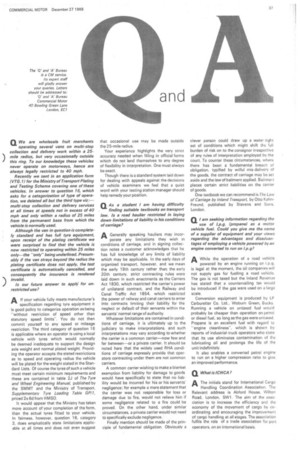As a student I am having difficulty finding suitable textbooks
Page 39

If you've noticed an error in this article please click here to report it so we can fix it.
on transport law. Is a road haulier restricted in laying down limitations of liability in his conditions of carriage?
AGenerally speaking hauliers may incor
porate any limitations they wish in conditions of carriage, and in signing collection notes a customer acknowledges that he has full knowledge of any limits of liability which may be applicable. In the early days of organized transport, however, and we mean the early 19th century rather than the early 20th century, strict contracting rules were laid down in such enactments as the Carriers Act 1830, which restricted the carrier's power of unilateral contract, and the Railway and Canal Traffic Act 1854. which restricted the power of railway and canal carriers to enter into contracts limiting their liability for the neglect or default of their servants within the servants' normal range of authority.
Whatever limitations are contained in conditions of carriage, it is ultimately up to the judiciary to make interpretations, and such interpretations may vary according to whether the carrier is a common carrier—now few and far between—or a private carrier. It should be noted here that the widely used R HA conditions of carriage expressly provide that operators contracting under them are not common carriers.
A common carrier wishing to make a blanket exemption from liability for damage to goods would have specifically to state that no liability would be incurred for his or his servants' negligence: for example a mere statement that the carrier was not responsible for loss or damage due to fire, would not relieve him if some negligence related to a fire could be proved. On the other hand, under similar circumstances, a private carrier would not need to specifically exclude negligence.
Finally mention should be made of the principle of fundamental obligation. Obviously a clever person could draw up a water tight set of conditions which might shift the full burden of risk on to the consignor irrespective of any rules of interpretation employed by the court. To counter these circumstances, where there has been a fundamental breach of obligation, typified by wilful mis-delivery of the goods, the contract of carriage may be set aside and the law of bailment applied. Bailment places certain strict liabilities on the carrier of goods.
One textbook we can recommend is The Law of Carriage by Inland Transport, by Otto Kahn. Freund, published by Stevens and Sons. London.












































































